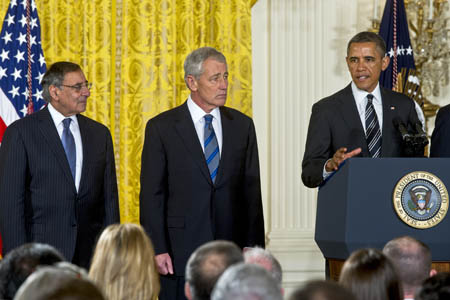President  Obama on Monday nominated former Nebraska Sen. Chuck Hagel, a Republican, to succeed Leon Panetta as Defense Secretary. Panetta has served in the post since July 2011. Obama said Hagel, if confirmed, would be the first person of enlisted rank and the first Vietnam War veteran—an infantryman who received two Purple Hearts for battle injuries—to hold the office. A two-term Senator who retired in 2009, Hagel, 66, is expected to have a tough confirmation, both because Democrats may not wish to go along with another Republican in the top defense post (Obama carried over Robert Gates from the Bush Administration) and because Hagel has publicly broken ranks with his own party on defense matters in recent years. After initially supporting US action in Iraq, Hagel switched to opposing the troop “surge” there and vowed to try to block it. He has continuously voiced support for sanctions rather than armed action to curb Iran’s nuclear program and is perceived as being less than a full supporter of Israel. White House spokesman Jay Carney said Monday that Hagel is a “staunch supporter” of Israel, is “in sync” with Obama’s defense policies overall, and represents a bipartisan choice. Sen. Mitch McConnell (R-Ky.), Senate minority leader, said on Jan. 6 Hagel would get “a fair hearing.” Although Sen. Tom Coburn (R-Okla.) has said Hagel lacks the experience of running a large organization, he successfully ran a telecom company as CEO in the 1990s. Hagel is also seen as an ardent supporter of veterans and served as chairman and CEO of the USO from 1987 to 1990. In an early job, he was deputy administrator of the Veterans Administration. Obama said Monday he hopes the Senate would act quickly to confirm Hagel. (Obama remarks) (Panetta statement) (See also AFPS report by Army Sgt. 1st Class Tyrone C. Marshall Jr.)
Obama on Monday nominated former Nebraska Sen. Chuck Hagel, a Republican, to succeed Leon Panetta as Defense Secretary. Panetta has served in the post since July 2011. Obama said Hagel, if confirmed, would be the first person of enlisted rank and the first Vietnam War veteran—an infantryman who received two Purple Hearts for battle injuries—to hold the office. A two-term Senator who retired in 2009, Hagel, 66, is expected to have a tough confirmation, both because Democrats may not wish to go along with another Republican in the top defense post (Obama carried over Robert Gates from the Bush Administration) and because Hagel has publicly broken ranks with his own party on defense matters in recent years. After initially supporting US action in Iraq, Hagel switched to opposing the troop “surge” there and vowed to try to block it. He has continuously voiced support for sanctions rather than armed action to curb Iran’s nuclear program and is perceived as being less than a full supporter of Israel. White House spokesman Jay Carney said Monday that Hagel is a “staunch supporter” of Israel, is “in sync” with Obama’s defense policies overall, and represents a bipartisan choice. Sen. Mitch McConnell (R-Ky.), Senate minority leader, said on Jan. 6 Hagel would get “a fair hearing.” Although Sen. Tom Coburn (R-Okla.) has said Hagel lacks the experience of running a large organization, he successfully ran a telecom company as CEO in the 1990s. Hagel is also seen as an ardent supporter of veterans and served as chairman and CEO of the USO from 1987 to 1990. In an early job, he was deputy administrator of the Veterans Administration. Obama said Monday he hopes the Senate would act quickly to confirm Hagel. (Obama remarks) (Panetta statement) (See also AFPS report by Army Sgt. 1st Class Tyrone C. Marshall Jr.)
Audio of this article is brought to you by the Air & Space Forces Association, honoring and supporting our Airmen, Guardians, and their families. Find out more at afa.orgWashington and its allies face a bottomless list of tasks, challenges, and...

